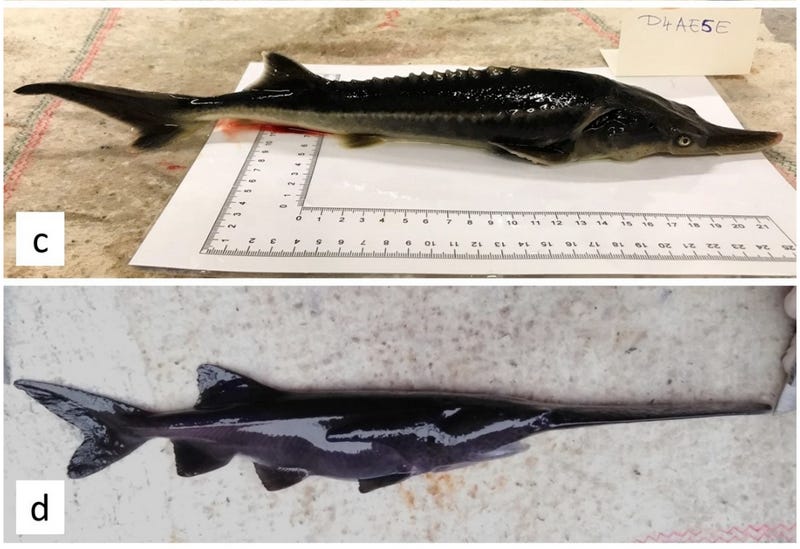Planning a #Special Military Operation Live
Join us on #DogShirtTV
Good Morning:
Russia, as seen from Kirkenes, Norway by the estimable Anastasiia Lapatina. If you look very closely, you can see a Russian Orthodox church. Here’s a map:
“May in the Arctic is something else,” Nastya tells me. December, I suspect, is even worse.
You can celebrate May, in the Arctic or elsewhere, by becoming a paid subscriber to #DogShirtDaily at 50 percent off as part of our special trolling sale:
Right now, 7 percent of subscribers are paid subscribers. I really think that number should be more like 12 percent.
Speaking of trolling, in 30 minutes, the estimable Holly Berkley Fletcher and I will be planning a #SpecialMilitaryOperation live on the show. Specifically, we’ll be storyboarding an operation for #LordLaser and #LaserLaser on the US Department of Agriculture’s North Korea-like Donald Trump banner, pictured here in an impromptu operation the other day with the no-less-estimable Kate Klonick.
It occurred to Holly and me that we could, with two lasers, a bit of imagination, some humor, some good designs prepared in advance, and some thought bubbles have Honest Abe narrate a story about hanging on the wall next to our current president. We’ll be working on this on today’s #DogShirtTV, with audience participation, of course.
Information about how to join is just tantalizingly below the paywall.
Yesterday on #DogShirtTV, the estimable Holly Berkley Fletcher, the estimable Minna Ålander, and I talked about how Trump’s attempts to bully his way to victory are going. We covered European responses to the cut-off of support to Ukraine, federal courts’ responses to blatant illegalities, and why its not actually 1933:
Yesterday On Lawfare
Compiled by the estimable Caroline Cornett
South Korea’s Digital Regulation Proposal Sparks U.S. Pushback
Andrew Yeo discusses major American tech companies’ concerns that South Korea’s Monopoly Regulation and Fair Trade Act (MRFTA) discriminates against them. Yeo highlights the need for the United States to be flexible on tariffs in the ongoing bilateral negotiations between the two countries given the potential use of the MRFTA as retaliation.
At stake for the U.S. is the diffusion of EU-inspired digital platform regulation under the DMA—or the so-called Brussels effect. In addition to South Korea, other tech-savvy countries, such as India, have proposed anti-competition laws to ensure fair and transparent competition in their digital market spaces. Even with the KFTC’s shift away from ex ante regulation, there is growing fear in the U.S. that passage of South Korea’s MRFTA might trigger a domino-like effect and provide other countries in Asia additional leverage—and a working template—to restrict U.S. companies in domestic markets.
On the Path to AI Sovereignty, AI Agency Offers a Shortcut
Aubra Anthony argues that countries in the global south pursuing artificial intelligence (AI) sovereignty—geopolitical independence and autonomy over a nation’s AI stack—should instead focus on regional collaboration among nations and using AI to fulfill their unique political and economic needs.
But paradoxically—especially for nations in the global south who may be joining this AI race without the luxury of economic advantage—defining and enacting AI sovereignty ultimately risks undermining its stated goals. Nations with limited market strengths seeking greater agency over their AI futures can benefit from considering how middle powers and small states have fostered conditions to support greater independence, autonomy, and resiliency in AI.
Podcasts
On Lawfare Daily, Quinta Jurecic sits down with Noah Bullock to discuss El Salvador President Nayib Bukele’s role in the Trump administration’s scheme to deport migrants under the Alien Enemies Act, his efforts to consolidate power, and the recent arrest of Noah’s colleague Ruth López.
Today’s #BeastOfTheDay is the sturddlefish, which earns its title today for sheer improbability:
Today’s Beast is the improbable because it’s man-made. It’s the result of fertilization of female sturgeons with sperm from male paddlefish in a Hungarian lab. The researchers were attempting to breed the highly endangered sturgeons in captivity and used paddlefish sperm as a control. Since the genetic lineage of the sturgeon and paddlefish diverged about 184 million years ago, it did not occur to them that paddlefish sperm might actually fertilize female sturgeons. And yet…
Behold! The control group produced not one but two separate varieties of hybrid fish, dubbed sturddlefish, because really, what else could you call them?
Congratulations to today’s Beast for existing, and congratulations to the researchers responsible for deciding not to make more of them.
You can read the paper documenting today’s Beast here.
In honor of today’s Beast, try mating with a kangaroo. We diverged from the kangaroo around 130 million years ago, so we should be able to get cute, hopping babies easily enough.
Today’s #BeastOfTheDay is not the pygmy nuthatch. Or the Venezuelan troupial.
Keep reading with a 7-day free trial
Subscribe to Dog Shirt Daily to keep reading this post and get 7 days of free access to the full post archives.










